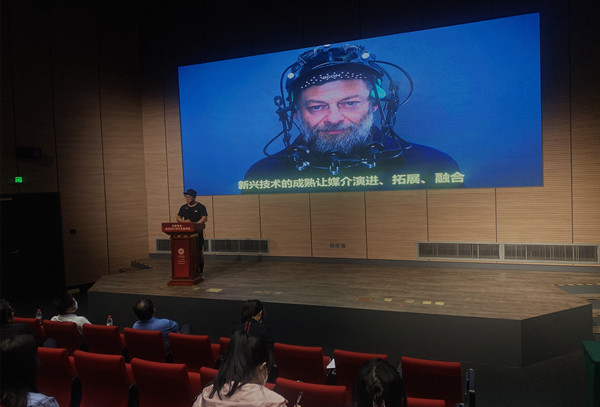Experts mull over virtual production in filmmaking
- By Zhang Rui
 0 Comment(s)
0 Comment(s) Print
Print E-mail China.org.cn, August 18, 2022
E-mail China.org.cn, August 18, 2022
Experts, filmmakers, and academics gathered at a forum on Tuesday during the 12th Beijing International Film Festival to discuss and explore the use of virtual production as well as the filmmaking trend.

Virtual production, including virtual filming, has been used more and more in films, TV series, commercials, and livestreaming in recent years, especially with regard to sci-fi shows. It is an emerging method that uses a suite of software tools to combine live-action footage and real-time computer graphics by exploiting and integrating VR, LED, and green screen technologies. This allows filmmakers and contributors across multiple locations to deliver timely feedback conveniently across digital or physical environments.
Wang Jianxin, an official from the Beijing Municipal Science & Technology Commission, said in his speech at the forum that in the current film and television industry, technological innovation has become one of the core driving forces for industrial upgrading.
"At present, the improvement in the domestic film production is benefiting from two dimensions of technological empowerment. One is to actively adopt the world's advanced technologies, and the other is to independently explore, innovate, and develop technologies that meet the requirements with Chinese characteristics," he said.
Wang believed that, for example, virtual preview filming technology will help improve production efficiency and lower costs caused by uncertainties during film production. "In the future, virtual production and high-tech format viewing experiences will still be the main focus of film technology innovation."
Eddie Lou, founder and CEO of Sandman Studios, a VR creative studio based in Beijing focused on creating premium and experimental VR experiences, said that narrative media is constantly evolving, and the maturity of emerging technologies will allow media to further evolve, expand, and integrate, creating a new narrative grammar.
"Virtual production technology will generate new forms for the film and television industry and create a new market field. It is an effective practice for technology to promote industry change," predicted Lou, who also is the founder and executive director of Sandbox Immersive Festival, China's biggest immersive media festival.
Chen Chao, executive director for virtual preview shooting in high-profile movie projects such as "A Writer's Odyssey," and most recently, "Moon Man," praised the efficiency and economy of the technology, which can also reduce production risks such as going over budget and unexpected delays, as well as the safety of an exhausted crew.
Yu Ji, managing partner and the director of the virtual filming business sector for company Surreal, believed that the production of visual content is about to undergo a major change and is characterized by mass, spectacle, and real-time technologies. "The threshold of film and television special effects has been further lowered. For the film and television industry, virtual filming is gradually changing from a filming and production tool to a starting point for promoting the innovation of the production process for the film and television industry and will eventually become an important engine for the entertainment industry, especially the sci-fi industry, to enter the metaverse era."

Several other experts, entrepreneurs, and university professors also joined different group discussions later in the day to discuss how virtual production may reshape the movie industry, what innovations and breakthroughs there are for virtual production filmmaking, and how China shall construct mature virtual production for the film and television industry, sharing their visions and technological insights. They also talked about AI, VR, XR, AR, digital virtual actors, and the metaverse.
But Mu Zhifei, director of the CG Conceptual Art Commission of the Chinese Film Art Direction Academy, pointed out virtual filming still needs a great cinematographer to guide the art direction and ensure a film's aesthetics. "When you make films, we should still focus on people and people's stories. You should know virtual production and visual effects can't guarantee a good film, they are just tools, and you can't overuse them."
He emphasized that technology should serve content and serve the diversification of film genres. "Creators should use virtual technology to present the beauty of philosophy, literature, history, spirit, and culture, and technological innovation and talent training should also take it as their responsibility to inherit and promote the excellent traditional Chinese culture."






Go to Forum >>0 Comment(s)